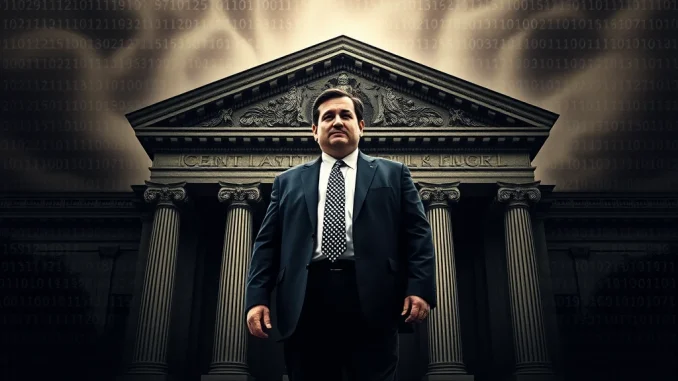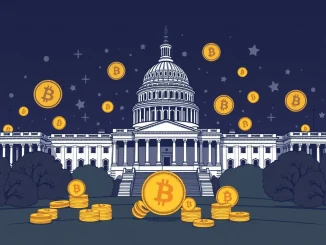
Is your digital privacy under threat? Senator Ted Cruz is stepping into the ring again, reigniting the debate around a U.S. Central Bank Digital Currency (CBDC). For cryptocurrency enthusiasts and privacy advocates alike, this is a crucial development. Cruz has just reintroduced a bill aimed at slamming the door shut on the Federal Reserve issuing a CBDC directly to consumers. Let’s dive into what this means and why it’s causing waves in the crypto world.
Why is Ted Cruz Fighting Against a Fed-Issued CBDC?
Senator Ted Cruz isn’t pulling any punches. He’s firmly against the idea of the Federal Reserve controlling a digital dollar that could be used directly by individuals. His primary concern? Privacy. Cruz argues that a Fed-issued CBDC opens the door to unprecedented government surveillance and control over our financial lives. This isn’t just about cryptocurrency; it’s about fundamental freedoms.
Here’s a breakdown of Senator Cruz’s core arguments against a CBDC:
- Privacy Concerns: A CBDC issued by the Federal Reserve could give the government a direct line of sight into every transaction you make. Imagine every purchase, every donation, every financial move being potentially tracked by the government.
- Government Overreach: Cruz believes a CBDC empowers the government to exert excessive control over the economy and individual finances. This could stifle innovation and lead to a less自由 (free) financial system.
- Risk of Centralization: CBDCs, by their very nature, centralize financial power. This is in stark contrast to the decentralized ethos of cryptocurrencies like Bitcoin, which aim to distribute power away from central authorities.
- Innovation Stifling: Cruz fears a Fed-issued CBDC could crowd out private sector innovation in digital payments and fintech. Why would private companies invest in new solutions if they have to compete with a government-backed digital currency?
Echoes of Tom Emmer: A Unified Front Against CBDCs
Senator Cruz isn’t alone in this fight. Representative Tom Emmer recently reintroduced similar legislation in the House of Representatives. This coordinated effort signals a growing political resistance to CBDCs within the U.S. government. Both Cruz and Emmer are champions of the idea that financial freedom and privacy are paramount, and they see a Fed-issued CBDC as a direct threat to these principles.
Think of it as a tag team effort. Emmer’s bill in the House and Cruz’s bill in the Senate create a powerful two-pronged approach to block the Federal Reserve from moving forward with a direct-to-consumer CBDC. This synchronized action significantly raises the stakes and sends a clear message to the Federal Reserve and the broader political landscape: there is strong opposition to this type of digital currency.
The Broader Context: Why is the Federal Reserve Considering a Digital Currency?
While Cruz and Emmer are raising alarm bells, it’s important to understand why the Federal Reserve is even exploring the idea of a digital currency in the first place. Many central banks around the world are researching or even piloting CBDCs. The motivations are varied, but often include:
- Modernizing Payment Systems: Cash usage is declining in many countries. CBDCs are seen as a way to modernize payment infrastructure and ensure the central bank remains relevant in the digital age.
- Financial Inclusion: Proponents argue that CBDCs could improve financial inclusion by providing access to digital payments for underserved populations who may not have bank accounts.
- Combating Illicit Activities: Ironically, while privacy is a concern for CBDC opponents, some argue that CBDCs could help combat illicit activities by making transactions more transparent (though this is debatable and depends heavily on the CBDC’s design).
- Maintaining Monetary Sovereignty: With the rise of private cryptocurrencies and stablecoins, some central banks see CBDCs as a way to maintain control over monetary policy and the national currency.
CBDC Ban: What are the Potential Implications?
If Senator Cruz’s bill, aiming for a CBDC ban, gains traction and becomes law, what could be the ripple effects?
- Setback for Federal Reserve CBDC Plans: The most immediate impact would be a significant blow to the Federal Reserve’s ongoing research and development of a CBDC. It could effectively halt any plans for a direct-to-consumer digital dollar in the U.S.
- Boost for Private Cryptocurrencies: A CBDC ban could be seen as a positive development for the broader cryptocurrency market. It might signal a more favorable regulatory environment for decentralized digital currencies and reduce the perceived competition from a government-backed alternative.
- Focus on Private Sector Innovation: Without the looming shadow of a Fed-issued CBDC, private companies in the fintech and crypto space might feel more encouraged to innovate and develop their own digital payment solutions.
- Ongoing Debate: Even if this bill passes, the debate around digital currencies and the role of the government in finance is far from over. The underlying issues of privacy, financial inclusion, and monetary policy will continue to be discussed and contested.
Federal Reserve Under Scrutiny: What Happens Next?
The Federal Reserve is now in a tricky position. Facing increasing political headwinds from figures like Ted Cruz and Tom Emmer, they will need to carefully consider their next steps regarding a CBDC. Will they push forward despite the opposition, or will they recalibrate their approach?
Here are some potential scenarios:
| Scenario | Potential Outcome |
|---|---|
| Bill Passes | Federal Reserve is legally barred from issuing a direct-to-consumer CBDC. CBDC development in the US is significantly curtailed. |
| Bill Fails | Federal Reserve continues CBDC research and development, potentially moving towards pilot programs and eventual implementation. |
| Compromise/Amendment | The bill could be amended to allow for a CBDC with stronger privacy protections, or to focus on wholesale CBDCs (for interbank settlements) rather than retail CBDCs. |
Actionable Insights: What Does This Mean for You?
Whether you’re a crypto investor, a privacy advocate, or simply someone interested in the future of finance, this Ted Cruz bill is something to watch closely. Here’s what you can do:
- Stay Informed: Keep up-to-date on the progress of this bill and the broader CBDC debate. Follow news outlets and engage in discussions on social media.
- Contact Your Representatives: If you have strong opinions on CBDCs, make your voice heard. Contact your Senators and Representatives to let them know your stance.
- Support Advocacy Groups: Organizations focused on digital privacy and financial freedom are actively engaged in this debate. Consider supporting their work.
- Understand the Technology: Educate yourself about CBDCs, cryptocurrencies, and the underlying technologies. The more informed you are, the better you can participate in the conversation.
Conclusion: A Critical Juncture for Digital Currency in the U.S.
Senator Ted Cruz’s reintroduction of this bill marks a critical moment in the ongoing saga of digital currency and regulation in the United States. The fight over a Fed-issued CBDC is not just about technology; it’s about fundamental questions of privacy, government power, and financial freedom. As this legislation moves forward, or doesn’t, it will undoubtedly shape the future landscape of digital finance in America. The stakes are high, and the world is watching to see what happens next in this pivotal battle for the future of money.



